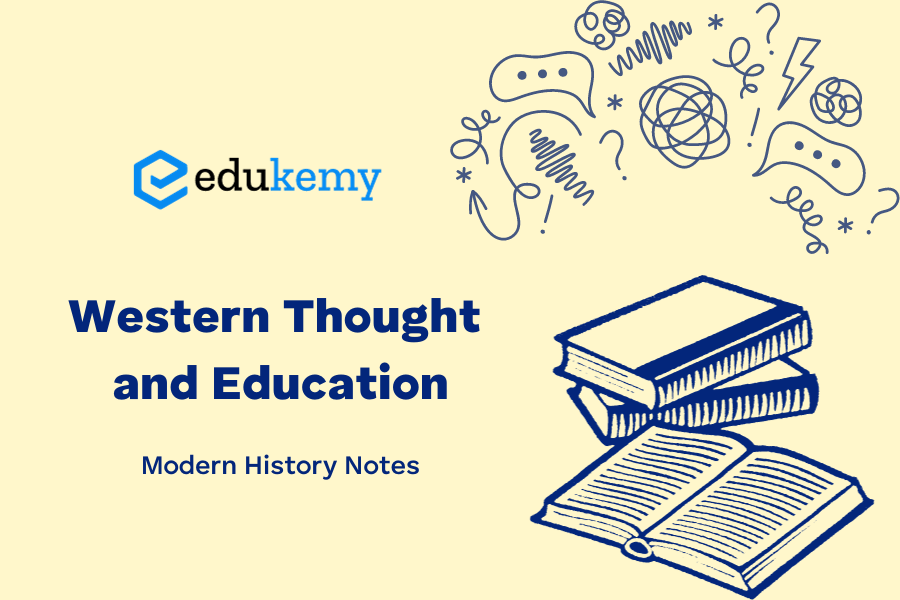- During the 19th century, the spread of modern Western Thought and Education had a profound impact on the Indian population. Here are some key points regarding the influence of Western education:
- Adoption of Modern Outlook: The introduction of modern education exposed a large number of Indians to rational, secular, democratic, and nationalist ideas prevalent in the Western world. Indians who received this education began to embrace these principles and developed a modern outlook. They saw the need for political, social, and economic reforms in India and aspired for a strong, prosperous, and united nation.
- Influence of Western Thinkers: Indian intellectuals studied and admired the nationalist movements in Europe, looking to thinkers like Rousseau, Paine, and John Stuart Mill as their political guides. They drew inspiration from the struggles of European nations against colonialism and imperialism. Leaders such as Martini, Garibaldi, and Irish nationalist figures became their political heroes.
- Awakening of National Consciousness: Modern education allowed Indians to analyze and understand the negative impacts of foreign rule. They keenly felt the humiliation of subjection and were motivated to work towards a free and independent India. Educated Indians played a vital role in becoming leaders and organizers of the national movement.
- English Language and Unity: The English language played a significant role in the spread of modern ideas among educated Indians. It became a medium of communication and exchange of ideas between individuals from different linguistic regions of the country. The adoption of English as a common language created a certain uniformity and a sense of community among the educated Indians, facilitating a shared nationalist outlook.
- Advocacy for Indian Languages: While English played a prominent role, political leaders like Dadabhai Naoroji, Sayyid Ahmed Khan, Justice Ranade, Tilak, and Gandhi advocated for a larger role for Indian languages in the educational system. They emphasized the importance of preserving and promoting Indian languages to maintain the cultural identity of the country.
- In summary, the spread of modern Western education and thought in India during the 19th century had a transformative effect. It instilled a modern outlook, fostered a sense of national consciousness, and exposed Indians to the ideas and struggles of nationalist movements in Europe. While English became a unifying language, there was also a push to promote Indian languages to preserve cultural identity. These developments played a crucial role in shaping the intellectual and political landscape of India and fueling the national independence movement.
Contents
Frequently Asked Questions (FAQs)
Q1: What is the foundation of Western thought in education?
A1: The foundation of Western thought in education is deeply rooted in classical Greek philosophy, particularly the ideas of Plato and Aristotle. Plato’s emphasis on abstract reasoning and the pursuit of knowledge through dialectic discussions laid the groundwork for the importance of intellectual inquiry. Aristotle, on the other hand, contributed to the development of a systematic approach to education, advocating for a curriculum that encompasses a broad range of subjects to nurture well-rounded individuals.
Q2: How has the Enlightenment influenced Western education?
A2: The Enlightenment era had a profound impact on Western education by promoting reason, individualism, and the scientific method. Thinkers like John Locke and Jean-Jacques Rousseau emphasized the importance of rational inquiry, critical thinking, and the inherent rights and potential of the individual. These ideas influenced the development of educational systems that aimed to cultivate independent thought, freedom of expression, and the pursuit of knowledge as essential components of a well-rounded education.
Q3: What role does humanism play in Western educational thought?
A3: Humanism has played a significant role in shaping Western educational thought by placing a strong emphasis on the study of classical literature, arts, and humanities. During the Renaissance, humanism emerged as a movement that celebrated human achievements, focusing on the value of education to enhance individual potential. This approach has influenced educational practices, promoting the idea that a well-rounded education should include the study of literature, history, philosophy, and the arts to foster a deep understanding of human culture and the human experience.
In case you still have your doubts, contact us on 9811333901.
For UPSC Prelims Resources, Click here
For Daily Updates and Study Material:
Join our Telegram Channel – Edukemy for IAS
- 1. Learn through Videos – here
- 2. Be Exam Ready by Practicing Daily MCQs – here
- 3. Daily Newsletter – Get all your Current Affairs Covered – here
- 4. Mains Answer Writing Practice – here

